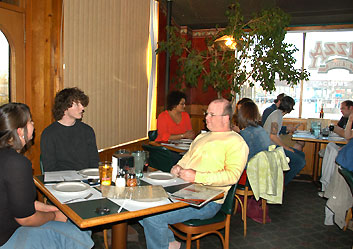
Members of the Mystery Church of Joplin and guests met recently to discuss community issues.
The subject was racism. Is it a problem in the Joplin area was the topic discussed by a large group of young adults at the April 14, 2008 convening of Theology on Tap held at a local Joplin restaurant.
Citing a lack of exposure to other cultures and an overall lower educational level amongst racism's proponents, the group, representing the nondenominational Mystery Church concluded that racism was not so much an "in your face" practice in the area as, instead, it was one now "covered up."
For anyone in the group who didn't think that racism was an issue at all, the Mystery Church pastor Steev Inge suggested that he or she visit any small local barbershop to see examples of racial tension.
Was racism a personal conviction or cultural indoctrination was asked by Jeff Hollingshead who was acting as moderator for the discussion. The responses in many cases were motivated by how "members of the audience grew up" and how they "felt threatened."
Recognize,
a poem by Nanda Nunnelly-Sparks
I speak to the monster of racism.
You stripped my grandmother of education,
You stole my mother from my father,
You mangled my self-esteem,
Now you stalk my children?
I recognize your power, but I will allow you no new blood.
Look me in the eye and tell me what you see.My grandmother is laughing.
My father is singing.
I am speaking.
My daughter is crying, but not for long.
Together, we see you for what you are.
No longer will we look away when you rip apart our brothers and sisters.
No longer will we sit by, while you dare to make us feel inferior.
We will look you in the eye because now, you must recognize--us.
What was interesting was how many in the conversation relocated to Joplin from some other place. As outsiders, they had a detachment that locals obviously didn't have. Inge, who had come from Dallas about five and a half years ago said that at the time he saw racism here as "overwhelming."
The size of cities in the Joplin area also was considered a factor. A girl who said she originally was from Chicago mentioned how people segregate themselves there by living in neighborhoods that are basically ghettos. While such segregation insulates against discrimination from other groups it doesn't change the attitudes of people living there about others different from themselves.
How otherwise young children with a blank slate become bigoted was blamed on an educational curriculum that opens up the eyes of children by calling attention to differences in people without instilling an appropriate belief system. Sparing educators the blame, however, was the idea that racism was "grandfathered in," that prejudice was instilled in youngsters by family members--parents and grandparents in a vicious cycle.
Out of the mouths of babes come interesting comments. One of the women in the group who is a teacher said that she had tried to defend a student who was perceived to be different by her class. One of the students countered with the argument that she was "racist against racists." Perhaps, this suggests the power of majority thinking.
When one girl who believes in the concept of goodness as an innate quality, said that she thinks racism is caused by cultural indoctrination, Inge cut in saying that he thought it was hard to blame the problem on culture when it "emanates from people."
"The problem with the world is me," Inge said. "Dealing with who you are is the real issue." His comments came after somebody described how a staunch member of the KKK after becoming friends with a non-white repudiated his connection to the Klan.
An audience member of mixed blood speaks out
Nanda Nunnully-Sparks says that she's seen as much racism at the top of the educational ladder as at the bottom and unfortunately she's the focus of prejudice from both blacks and whites. Nunnully-Sparks is the offspring of a black college professor and a white mom whom she said had to leave Joplin in the late 1960s to marry because miscegenation in Joplin at the time was against the law. That she was nurtured by both parents gives her a unique unbiased attitude that many would agree would make the world a better place.
Sparks, who can be described as an intelligent, well-dressed, exceedingly handsome woman, says she sometimes blames herself for the hurt felt by her 14-year old daughter, but she would rather see attitudes of others changed. She cited the example of how the affluent parents of one of her daughter's friends refused to allow the girl to stay overnight. Her son, she said, ran into the same narrow-minded attitude.
"We need to change the hearts and minds of people to change culture," Inge said. "Everybody has a core set of beliefs." It's the belief system of knowingly imperfect human beings that Inge is suggesting needs to combat a racist attitude.
Inge believes that religion/church is just a system for finding out who individuals are. His Mystery Church was formed with the premise that understanding how to be good is not easy.
Next discussion on tap






Comments